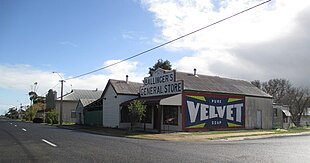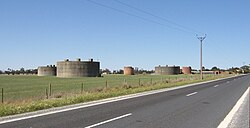Earth:Wolseley, South Australia
| Wolseley South Australia | |||||||||||||||
|---|---|---|---|---|---|---|---|---|---|---|---|---|---|---|---|
 Wolseley historic shop with restored advertising sign on the side | |||||||||||||||
| Script error: No such module "Australian place map". | |||||||||||||||
| Coordinates | [ ⚑ ] : 36°22′11″S 140°54′15″E / 36.369661°S 140.904151°E[1] | ||||||||||||||
| Population | 180[2] | ||||||||||||||
| Established | 8 May 1884 (town) 16 March 2000 (locality)[3][4] | ||||||||||||||
| Postcode(s) | 5269[5] | ||||||||||||||
| Elevation | 110 m (361 ft)[6] | ||||||||||||||
| Time zone | ACST (UTC+9:30) | ||||||||||||||
| • Summer (DST) | ACST (UTC+10:30) | ||||||||||||||
| Location |
| ||||||||||||||
| LGA(s) | Tatiara District Council[1] | ||||||||||||||
| Region | Limestone Coast[1] | ||||||||||||||
| County | Buckingham[1] | ||||||||||||||
| State electorate(s) | MacKillop[7] | ||||||||||||||
| Federal Division(s) | Barker[8] | ||||||||||||||
| |||||||||||||||
| |||||||||||||||
| Footnotes | Adjoining localities[1] | ||||||||||||||
Wolseley (formerly Tatiara) is a small South Australian town near the Victorian border. It is five kilometres south of the Dukes Highway and 13 kilometres east of Bordertown. It was first proclaimed a town in 1884.
The 2016 Australian census which was conducted in August 2016 reports that Wolseley had a population of 180 people.[2]
History
The town was surveyed in 1884, and initially named Tatiara, which was described as an "Aboriginal word from the Jackegilbrab Tribe which HC Talbot states is divided into six clans (Kooinkill, Wirriga, Chala, Camiaguigara, Niall & Nunkoora)". The railway station was named after Lord Wolseley, who was the Commander-in-Chief of the British Army.[10] The name of the town was changed to match the name of the station on 20 February 1941.[11]
Early in World War II, RAAF No. 12 Inland Aircraft Fuel Depot was established at Wolseley, with an initial capacity of 1.27 megalitres (280,000 imp gal; 340,000 US gal) in three tanks camouflaged to look like farm buildings. The depot started operations in 1942 and three additional tanks were added later. It was disbanded on 14 June 1944.[12] It is listed on the South Australian Heritage Register as the Wolseley Inland Aircraft Fuel Depot.[13]
Railway
The Adelaide–Wolseley railway was opened from Adelaide east to Wolseley railway station in the early 1880s built to 1,600 mm (5 ft 3 in) broad gauge. The Serviceton railway line from Melbourne reached Serviceton in Victoria in 1886, and the three miles from Wolseley to Serviceton was completed by the South Australian Railways in 1887, completing a broad gauge rail link between Adelaide and Melbourne. Around the same time, the Mount Gambier railway line 1,067 mm (3 ft 6 in) narrow gauge railway extended to Wolseley station from the south, creating a break-of-gauge rail junction.
By May 1883, rail construction had not yet been completed, but trains were able to operate regularly from Bordertown on the Adelaide line and from Custon on the Mount Gambier line, continuing through Naracoorte to Kingston SE.[14]
In 1881, the Government of South Australia authorised the construction of a 3 ft 6 in (1,067 mm) railway from "University Block No. 3" near the southern border of the Hundred of Tatiara to Border Town.[15] It had previously authorised the construction from Naracoorte to that point in 1879.[16]
In the 1950s the break-of-gauge was abolished by the conversion of the Mount Gambier line to broad gauge. The line to Mount Gambier has been out of use since the conversion of the Adelaide – Melbourne line to 1,435 mm (4 ft 8 1⁄2 in) standard gauge on 12 April 1995, pending possible conversion to standard gauge. If it is converted, it will become the first railway line in Australia to have ever been converted to all 3 gauges.
Railway containers
In 1936, to help overcome some of the inconveniences of the break of gauge, containers were introduced to allow though shipment of goods without the need for transshipment.[17]
Governance
Wolseley is located in the federal division of Barker, the state electoral district of MacKillop and the local government area of Tatiara District Council.[8][7][1]
See also
References
- ↑ 1.0 1.1 1.2 1.3 1.4 1.5 "Search results for 'Wolseley, LOCB' with the following datasets being selected – 'Suburbs and Localities', 'Counties', 'Local Government Areas', 'SA Government Regions' and 'Gazetteer'". Government of South Australia. http://location.sa.gov.au/viewer/?map=roads&x=140.91911&y=-36.37517&z=12&uids=41,19,2,20,105&pinx=140.905510&piny=-36.368190&pinTitle=Location&pinText=Wolseley,+Locb.
- ↑ 2.0 2.1 Australian Bureau of Statistics (27 June 2017). "Wolseley". 2016 Census QuickStats. http://www.censusdata.abs.gov.au/census_services/getproduct/census/2016/quickstat/SSC41615.
- ↑ "Untitled Proclamation (for the Town of Tatiara)". South Australian Government. 8 May 1884. pp. 1740–1741. http://www8.austlii.edu.au/au/other/sa_gazette/1884/23.pdf.
- ↑ Lawson, Robert (16 March 2000). "GEOGRAPHICAL NAMES ACT 1991 Notice to Assign Names and Boundaries to Places (in the District Council of Tatiara)". South Australian Government. p. 1434. http://governmentgazette.sa.gov.au/sites/default/files/public/documents/gazette/2000/March/2000_045.pdf.
- ↑ Wolseley Postcode Australia Post. Retrieved on 2008-05-29
- ↑ "Search results for 'Wolseley Railway Station' with the following datasets being selected – 'Suburbs and Localities' and 'Gazetteer'". Government of South Australia. http://location.sa.gov.au/viewer/?map=roads&x=140.90554&y=-36.36642&z=15&uids=19,105&pinx=140.904560&piny=-36.365460&pinTitle=Location&pinText=Wolseley+Railway+Station,+Rsta.
- ↑ 7.0 7.1 "District of Mount Gambier Background Profile". Electoral Commission SA. https://www.ecsa.sa.gov.au/publications/electoral-district-of-mackillop-pdf/download.
- ↑ 8.0 8.1 "Federal electoral division of Barker". Australian Electoral Commission. http://www.aec.gov.au/profiles/sa/files/2011/2011-aec-a4-map-sa-barker.pdf.
- ↑ 9.0 9.1 9.2 "Monthly climate statistics: Summary statistics PADTHAWAY SOUTH (nearest weather station)". Commonwealth of Australia , Bureau of Meteorology. http://www.bom.gov.au/climate/averages/tables/cw_026100.shtml.
- ↑ "Placename Details: Wolseley". Government of South Australia. http://maps.sa.gov.au/plb/#.
- ↑ McEwin, A. Lyell (20 February 1941). "ALTERATION OF NAMES OF TOWNS AND PLACES". South Australian Government. p. 225. http://www8.austlii.edu.au/au/other/sa_gazette/1941/8/225.pdf.
- ↑ Interpretative sign at the site west of Wolseley
- ↑ "Former Wolseley Inland Aircraft Fuel Depot including pump house, drum filling platform and six fuel tanks". South Australian Heritage Register. Department of Environment, Water and Natural Resources. http://maps.sa.gov.au/heritagesearch/HeritageItem.aspx?p_heritageno=21067.
- ↑ "WOLSELEY.". The Border Watch (Mount Gambier, SA): p. 2. 12 May 1883. http://nla.gov.au/nla.news-article78994790.
- ↑ Tatiara and Bordertown Railway 44 Vic., 1881, No. 200, Government Printer, 2009-05-14, http://trove.nla.gov.au/work/37694484, retrieved 4 August 2015
- ↑ Naracoorte and Tatiara Railway 43 Vic., 1879, No. 131, Government Printer, 2008-06-20, http://trove.nla.gov.au/work/37694232, retrieved 4 August 2015
- ↑ "New Freight Containers For S.E. Railway Services.". The Advertiser (Adelaide): p. 19. 23 April 1936. https://trove.nla.gov.au/newspaper/article/74158927/7298810.
 |


